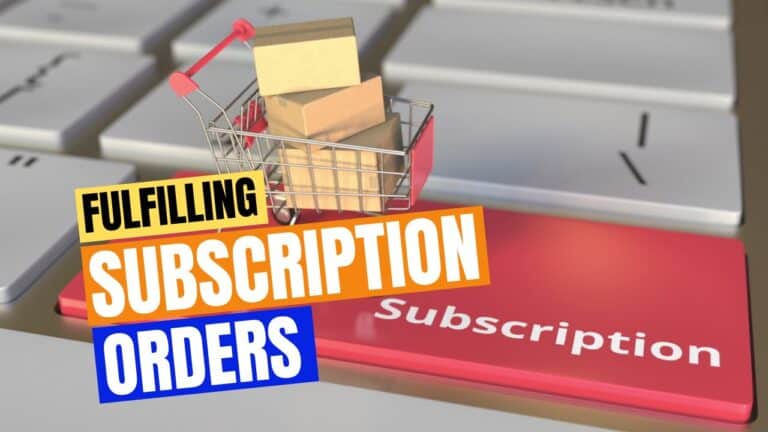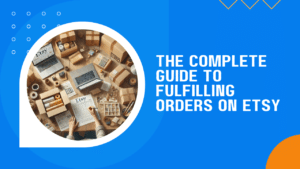Subscription-based models are becoming increasingly popular in e-commerce, as they provide customers with a more convenient way to purchase and receive products, and businesses with a steady stream of revenue.
However, fulfilling these types of orders can be complex, requiring a different approach than traditional one-time orders. In this article, we will discuss the best practices for fulfilling subscription orders on an e-commerce website, including automating the fulfillment process, tracking orders, and handling customer changes and cancellations.
By the end of this article, you will have a better understanding of how to effectively fulfill subscription orders, resulting in improved customer satisfaction and increased revenue for your business.
What Are Subscription-Based Models?
Subscription-based models refer to a business model where customers pay a recurring fee, usually on a regular basis (e.g. monthly, quarterly, annually) in exchange for access to products or services. This model is commonly used in industries such as streaming services, software, and e-commerce.
In e-commerce, subscription-based models can include regular deliveries of products, such as a monthly box of snacks or a quarterly delivery of beauty products. Subscription-based models can also include access to exclusive content or membership benefits, such as a subscription to an online course or a membership to a retail store that offers discounts to members.
The main advantage of subscription-based models is that it provides a predictable and steady revenue stream for businesses. It also gives a convenience for customers to have a regular delivery of products they need and enjoy without having to remember to place an order every time.
Additionally, it can also foster customer loyalty and retention, as customers are more likely to remain subscribed if they are satisfied with the products or services they are receiving.
What Are Some Examples of Subscription Based Products?
There are many different types of products and services that can be offered through a subscription-based model. Some examples include:
- Streaming Services: Services such as Netflix, Hulu, and Spotify offer monthly or yearly subscriptions for access to movies, TV shows, and music.
- Software: Many software companies offer subscription-based access to their products, such as Adobe Creative Cloud or Microsoft Office 365.
- E-Commerce Products: Products such as monthly boxes of snacks, cosmetics, or grooming products, quarterly deliveries of wine or beer, or regular deliveries of household essentials like toilet paper or pet food.
- News and Magazine: Many newspapers and magazines offer digital subscriptions for access to their content.
- Online Learning: Platforms such as Udemy, Coursera, or Skillshare offer subscriptions to access to their online courses.
- Fitness and wellness: Many gyms and fitness studios offer monthly or yearly memberships, some even offer online workout programs, and nutrition plans.
- Personalized services: Personalized meal plans, styling and grooming services, and personal shopping services are also available through subscription-based models.
These are just a few examples of the many different types of products and services that can be offered through a subscription-based model. As technology and e-commerce continue to evolve, the possibilities for subscription-based products and services will likely continue to expand.
The Unique Challenges of Fulfilling Subscription Based Orders
Ecommerce stores that offer subscription-based products can face several challenges when fulfilling orders:
Inventory management
Subscription-based models require businesses to have a clear understanding of their inventory levels and to have a reliable and efficient system for managing and reordering inventory. Failing to keep sufficient stock of products can lead to stockouts and disappointed customers.
Billing and payments
Subscription-based models require businesses to have a system in place for recurring payments and billing. This can include setting up automatic payments, such as with a recurring credit card charge, or setting up a recurring invoice.
Businesses also need to have a process in place for handling changes or cancellations to billing, such as providing customers with the ability to update their payment information or cancel their subscription.
Customer management
Subscription-based models require businesses to have a process in place for handling customer changes or cancellations. This can include providing customers with an easy way to update their shipping or billing information, or to cancel or pause their subscription. Additionally, businesses need to have a clear and easy-to-understand policy for refunds or credits for canceled orders.
Shipping and tracking
Subscription-based models require businesses to have a system in place for shipping and tracking orders.
This can include integrating with shipping and tracking systems, such as those offered by major carriers, and providing customers with up-to-date information on the status of their orders.
Communication
Subscription-based models require businesses to have a clear communication plan with customers regarding their subscription status, shipping times, and any issues.
This can help to minimize confusion and dissatisfaction, as well as ensuring customer loyalty.
Data and reporting
Subscription-based models require businesses to have a system in place for tracking and generating reports on recurring and subscription revenue and customer retention and cancellation rates. This can help businesses to monitor their performance and make data-driven decisions to improve their subscription offerings.
Tips for Fulfilling Subscription Based Orders
To ensure customer satisfaction and success in fulfilling subscription-based orders, it’s important to have the right processes and systems in place.
- Automate your fulfillment process: Use automation tools to streamline the fulfillment process, such as order tracking, inventory management, and shipping. This can help to reduce errors and ensure that orders are fulfilled on time.
- Keep accurate inventory: Regularly review and update your inventory levels to ensure you have the products on hand to fulfill orders. This can help to prevent stockouts and disappointment for customers.
- Communicate with customers: Have a clear communication plan in place for keeping customers informed about their subscription status, shipping times, and any issues. This can help to minimize confusion and dissatisfaction and ensure customer loyalty.
- Have a system for handling changes and cancellations: Provide customers with an easy way to update their shipping or billing information, or to cancel or pause their subscription. Have a clear and easy-to-understand policy for refunds or credits for canceled orders.
- Monitor customer retention and cancellation rates: Track and generate reports on recurring and subscription revenue and customer retention and cancellation rates. This can help businesses to monitor their performance and make data-driven decisions to improve their subscription offerings.
- Personalize the experience: Personalize the subscription experience by offering different options and frequencies of delivery, as well as customizing the content of the subscription boxes based on customer preferences.
- Be flexible: Be flexible with customers by allowing them to make changes to their subscriptions, such as pausing or skipping a delivery or changing the frequency of delivery.
- Make it easy to subscribe: Make it easy for customers to subscribe by providing clear and detailed information about the subscription process, and by offering different billing options (e.g. monthly, quarterly, annually).
- Offer incentives: Offer incentives such as discounts or free items for subscribing, or offer rewards for customer loyalty.
- Offer discreet shipping options: Some customers may want to order a subscription box as a gift but not want the recipient to know what is inside or they may be ordering something like a skin cream for a condition they have that they don’t want their nosy neighbors to be made aware of. Offering discreet packaging options can bring in additional customers.
- Continuously improve: Continuously gather feedback and ask for suggestions from customers to improve the overall customer experience and tailor the subscription to their needs.
Take Your Subscription Based Fulfillment to the Next Level
If you’re an e-commerce business looking to implement a subscription-based model, or if you’re already offering subscription-based products and services and looking to improve your fulfillment process, ShipBuddies can help.
Our team of experts has the knowledge and experience to help you automate your fulfillment process, keep accurate inventory, communicate effectively with customers, handle changes and cancellations, monitor customer retention, personalize the experience, be flexible, make it easy to subscribe, offer incentives, and continuously improve the customer experience.
Don’t let the complexities of fulfilling subscription-based orders hold you back from success. Contact ShipBuddies today to learn more about how we can help take your business to the next level.









